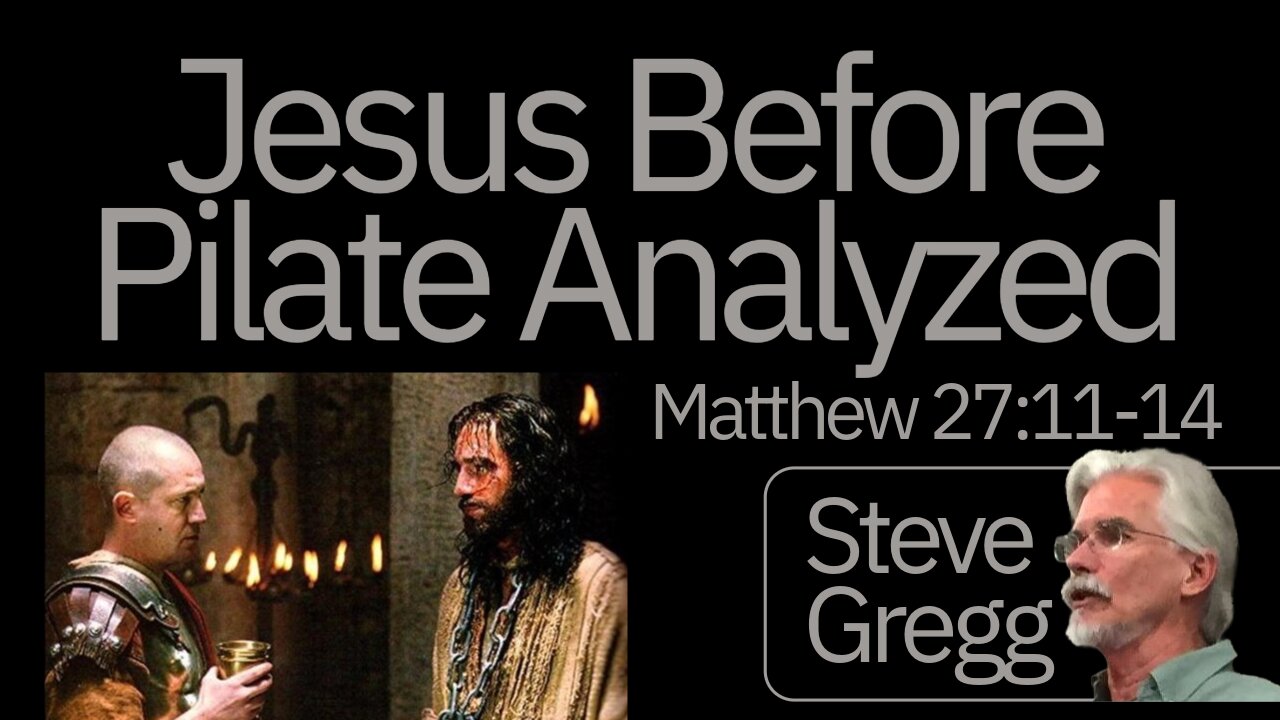Premium Only Content

Jesus Before Pontius Pilate Analyzed by Steve Gregg (Matthew 27:11-14)
https://thenarrowpath.com | Steve Gregg's lecture on Matthew 27:11–14 explores Jesus' trial before Pontius Pilate, focusing on the historical and legal context. The Sanhedrin, unable to execute Jesus due to Roman law, brought Him to Pilate with fabricated charges, using blasphemy as a pretext for their hatred. Pilate, skeptical of the Jewish leaders' motives and uninterested in blasphemy, questioned Jesus about being the king of the Jews. Jesus' response that His kingdom is not of this world, highlighted its non-threatening nature to Rome. Gregg contrasts Matthew's brief account with John's detailed version, noting Pilate's marvel at Jesus' silence amid accusations. The lecture addresses cultural nuances, such as the Jews' avoidance of the praetorium to stay ceremonially clean, and suggests divine intervention ensured Jesus' crucifixion fulfilled His prophecy. | Transcript: https://opentheo.org/i/765611936653040110/matthew-2711-2714
Matthew 27:11-14
English Standard Version
Jesus Before Pilate
11 Now Jesus stood before the governor, and the governor asked him, “Are you the King of the Jews?” Jesus said, “You have said so.” 12 But when he was accused by the chief priests and elders, he gave no answer. 13 Then Pilate said to him, “Do you not hear how many things they testify against you?” 14 But he gave him no answer, not even to a single charge, so that the governor was greatly amazed.
OUTLINE
1. Introduction to the Trial (Matthew 27:11):
• Jesus stood before Pontius Pilate, the Roman governor of Judea, after the Sanhedrin condemned Him for claiming to be the Christ, labeling it blasphemy.
• The Sanhedrin's true motive was hatred, using blasphemy as a pretext, but lacked execution authority under Roman law, requiring Pilate's approval.
2. Pilates Reluctance and Context (Matthew 27:11):
• Pilate had little interest in blasphemy or pleasing the Jews, complicating their efforts to secure Jesus' crucifixion.
• His sympathy for Jesus may have stemmed from disliking the Jewish court, and Matthew's account is brief compared to John's extensive treatment.
3. Detailed Exchange in John 18:28–32:
• The Jews avoided the praetorium (Pilates house) to remain ceremonially clean for Passover, reflecting hypocritical concern amid their immoral intent.
• Pilate asked, What accusation do you bring? suggesting skepticism, met with the Jews' evasive reply, If he were not an evildoer, we would not have delivered him.
• Pilate offered them to judge Jesus under their law, but they admitted their limitation: It is not lawful for us to put anyone to death, aligning with Jesus' prophecy of crucifixion.
4. Pilates Knowledge of Jesus (Matthew 27:11):
• Pilate likely knew of Jesus' activities in Jerusalem but not the specific charges, given Jesus' public ministry under his governance.
• He questioned, Are you the king of the Jews? prompting Jesus' response, "It is as you say", a concise affirmation.
5. Jesus Response and Kingdom (John 18:33–36):
• In John, Jesus asked if Pilate's question was personal or rumor-driven, distinguishing between idle curiosity and spiritual seeking.
• Jesus clarified, My kingdom is not of this world, noting His servants did not fight, unlike earthly kingdoms, posing no threat to Rome.
6. Pilate's Further Inquiry (John 18:37–38):
• Pilate asked, "Are you a king then?", to which Jesus affirmed, "You say rightly that I am a king", adding His purpose was to testify to truth.
• Pilate's cynical "What is truth?" reflected doubt, yet he found no fault in Jesus, a stance reinforced by Jesus' silence during accusations (Matthew 27:12–14).
7. Jesus' Silence and Pilate's Reaction (Matthew 27:12–14):
• Despite numerous accusations from chief priests and elders, Jesus remained silent, astonishing Pilate.
• This silence, paired with private dialogue (per John), moved the cruel governor, though he likely never converted.
8. Theological and Historical Implications:
• Jesus' trial inverted roles: Pilate was on trial before Christ, facing a decision with eternal consequences.
• Gregg suggests God prevented a mob execution (e.g., Stephens' case) to fulfill Jesus' predicted crucifixion by Rome.
9. Conclusion:
• The accounts reveal Jesus' innocence and divine plan, with Pilate's marvel and the Jews' actions underscoring the cultural and spiritual dynamics.
• Listeners are urged to decide Jesus' truth, impacting their destiny, unlike Pilate's apparent rejection.
#jesus #pontiuspilate #trial #analysis #matthew27 #gospelofmatthew #thenarrowpath #stevegregg
-
 18:11
18:11
The Narrow Path
2 months agoAbomination of Desolation: Caller Disagrees with Steve Gregg
911 -
 LIVE
LIVE
Cewpins
3 hours agoSunday Sesh!🔥Rumble Giveaway Tonight!🍃420💨!MJ !giveaway
202 watching -
 3:03:11
3:03:11
Conductor_Jackson
4 hours agoLet’s Play BioShock Infinite Burial at Sea Episode 2!
7.53K -
 DVR
DVR
EricJohnPizzaArtist
6 days agoAwesome Sauce PIZZA ART LIVE Ep. #63: Charlie Sheen
35.9K4 -
 LIVE
LIVE
THOUGHTCAST With Jeff D.
2 hours agoTHOUGHTCAST Jeff and Keegan play Left 4 Dead 2. Classic games
39 watching -
 2:43:09
2:43:09
putther
6 hours ago $0.25 earned⭐ GTA ONLINE BOUNTIES THEN GTA IV ❗
60.2K4 -
 6:31:38
6:31:38
GritsGG
9 hours agoQuad Win Streaks!🫡 Most Wins in WORLD! 3600+
64.9K1 -
 1:20:13
1:20:13
Sports Wars
14 hours agoCollege Football UPSETS, MLB Playoff Drama, NFL Week 4
113K15 -
 LIVE
LIVE
Spartan
6 hours agoOMiT Spartan | Watching TSM 5K with chat + Black Myth Wukong + Ranked on Infinite Maybe
116 watching -
![🔴[LIVE] Sept RCP #27💜 [English Chat] 😍DGG-a-Thon! Forever Skies maybe other game later ....💜](https://1a-1791.com/video/fwe2/ee/s8/1/0/t/e/m/0temz.0kob-small-LIVE-Sept-RCP-27-English-Ch.jpg) 4:05:33
4:05:33
Deaf Gamer Girl
5 hours ago🔴[LIVE] Sept RCP #27💜 [English Chat] 😍DGG-a-Thon! Forever Skies maybe other game later ....💜
36.9K